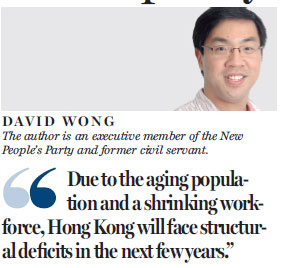Hong Kong needs a more proactive economic policy
Updated: 2016-03-04 08:38
By David Wong(HK Edition)
|
|||||||
The Budget announced by Financial Secretary John Tsang Chun-wah is probably best described as a balanced one. With a surplus of tens of billions of dollars at his disposal, there was much he could do. As in the previous few years, he proposed one-off relief measures such as lowering profits and salaries taxes, waiving rates and an extra monthly payment to welfare recipients. These so-called "returning wealth back to the community" initiatives are standard features of the Budget nowadays. The public has already grown used to them. Obviously, most people in the community benefit from these measures. So it is not surprising that the Budget was well received overall.
It was also noteworthy that this year's budget speech put more emphasis on developing a "new economy". The transition to a knowledge-based economy with a focus on new and emerging technology has been the main aim of the government for over a decade. Sadly, not enough progress had been made in previous years. It is only recently that there seems to have been more concrete advancement. The establishment of the Innovation and Technology Bureau was delayed for three years by the opposition's filibustering tactics in the Legislative Council. As investing in research and development often takes years, if not longer, it would be unfair to expect the bureau to deliver spectacular results in just a few months.
As such, Hong Kong is lagging behind other economies in the region. South Korea, Taiwan and Singapore have all established firm footholds in various fields. Shenzhen, a city long regarded by Hong Kong residents as merely a place to buy cheap counterfeit goods and enjoy a massage, has transformed itself into a new technology hub. Global technology conglomerates such as Tencent, Huawei and Dajiang are all based in Shenzhen. So far, it is hard to name any Hong Kong technology firm which can compete on a global scale. On the bright side, with the prevalence of the Internet and smartphones, most people can now understand the importance of innovation and technology. Back in the early 2000s, the community was generally skeptical. It largely preferred the government to focus on traditional sectors. This made promoting innovation in Hong Kong even harder. Now, with more local youngsters establishing successful new businesses, they have set a good example in showing that this new economy is feasible.
Many in Hong Kong have long complained that our economy is too narrowly focused on the financial and real estate sectors. There are not enough opportunities for the younger generation to develop their full potential. Echoing the national campaign for encouraging people to do business creatively, now is the time for the community to embrace innovation and technology and make up for lost time.
In previous budget speeches, the financial secretary mentioned that there were some deep-rooted problems which need to be tackled. Due to the aging population and a shrinking workforce, Hong Kong will face structural deficits in the next few years. He has set up a working group on long-term fiscal planning. This has come up with some research findings. However, these were not mentioned in this year's Budget, nor were any proposals made on how to deal with structural deficits. On the contrary, the tax allowances of individuals and families were unexpectedly raised. This left even fewer people paying taxes. While this measure may benefit the economy in the short term, Hong Kong now has an even narrower tax base with the middle class shouldering a bigger proportion of the tax revenue. Moreover, previous proposals on improving the population structure and broadening the tax base were not followed up. Nothing was presented to the public for consultation.
Another problem is Hong Kong is facing a shortage of labor. This has plagued many sectors, such as construction and food and catering, for several years, with small and medium enterprises being the worst hit. This problem was mentioned in almost all budgets in the past few years, but the problem is still unresolved; no new ideas have emerged.
Last but not least, young people in Hong Kong, similar to those in many economies around the world, face challenges. There are not enough university places for high school graduates who achieve the minimum examination requirements. Tuition fees remain high; students have to carry the heavy burden of student loans upon graduation. The entry-level salaries of graduates have barely improved, while housing prices have skyrocketed.
These deep-rooted problems cannot be easily resolved. It requires skills and patience to build a consensus on a solution that most in the community deem acceptable. Unfortunately, the opposition parties are determined to block and delay all important government initiatives - especially urgent ones. With government officials having to make extra efforts even during day-to-day operations, it is unlikely that adequate attention is being paid to deal with these deep-rooted problems. In the end, it is the younger generation that will suffer most.

(HK Edition 03/04/2016 page10)